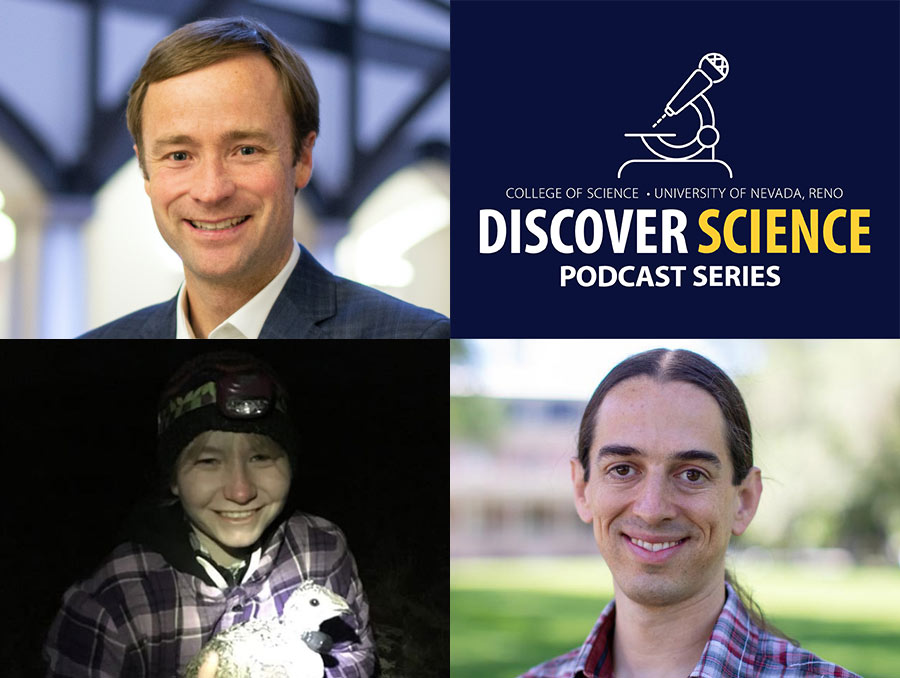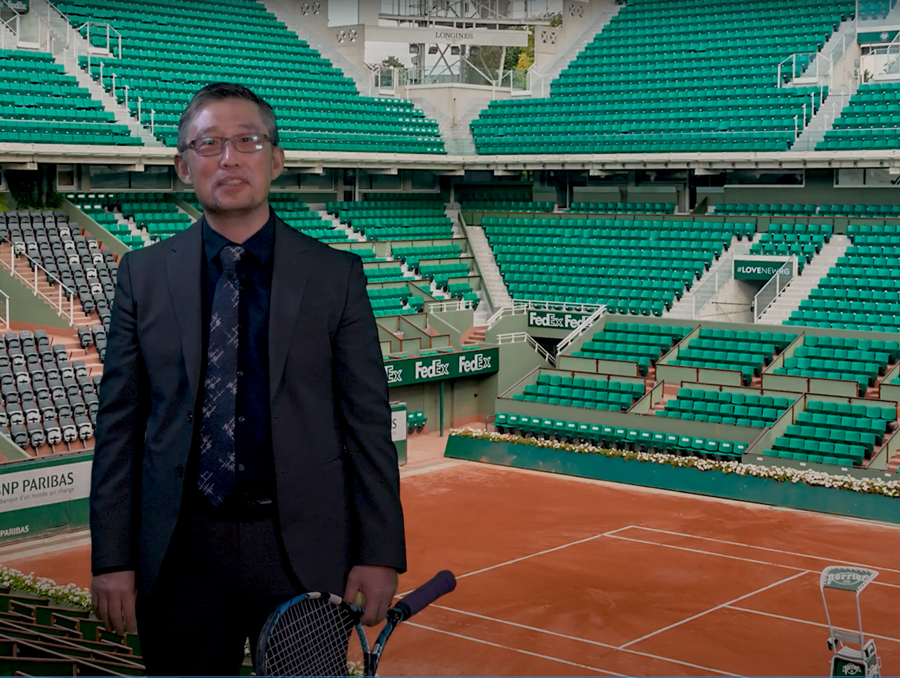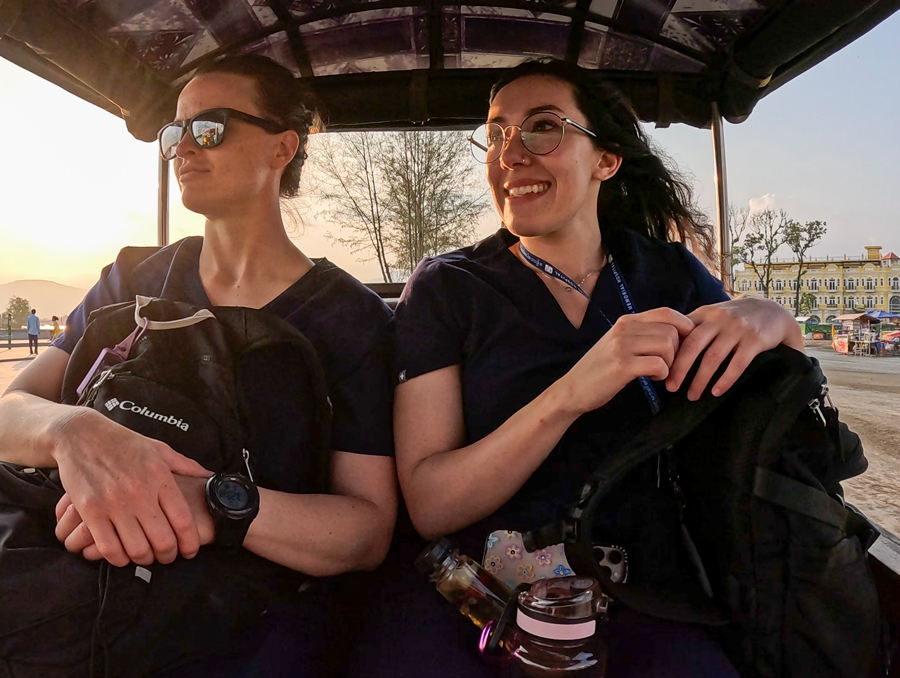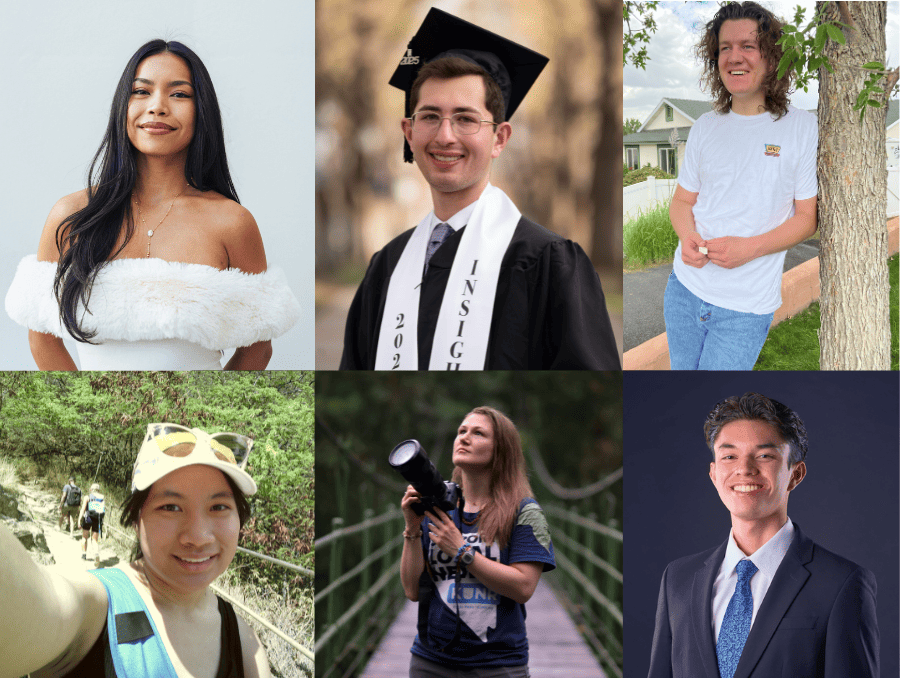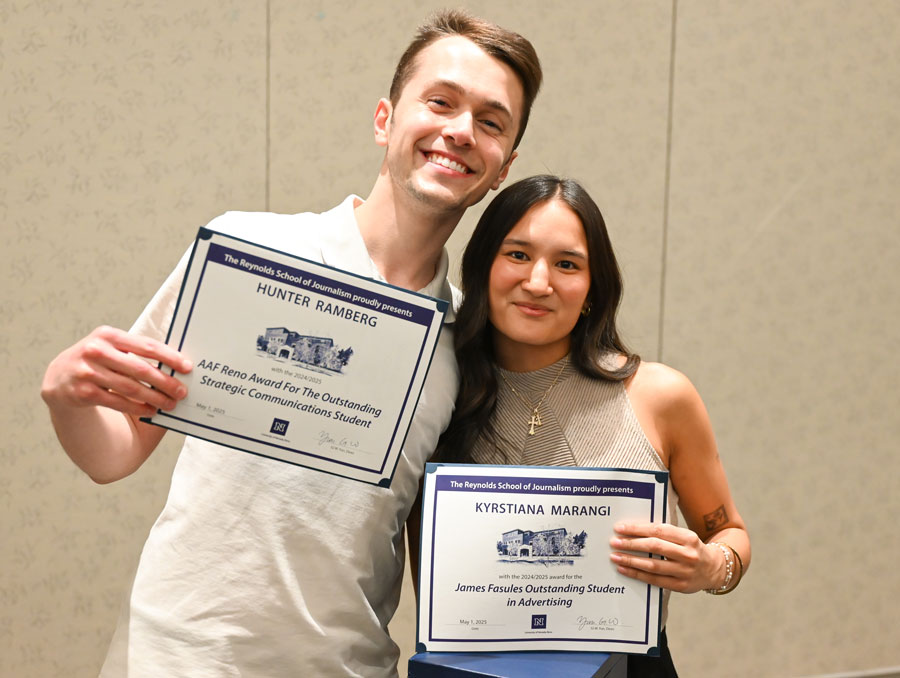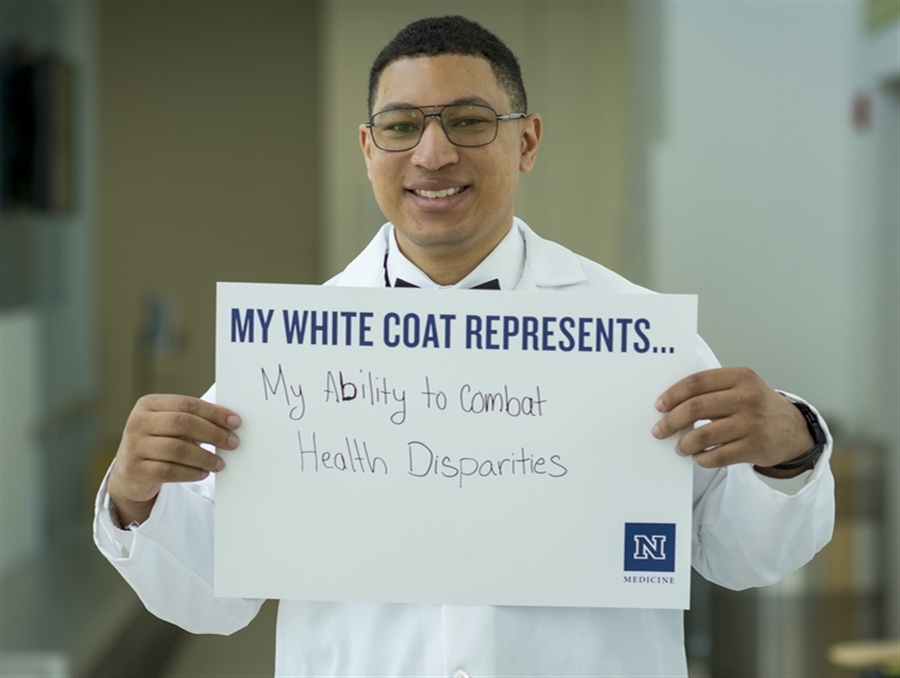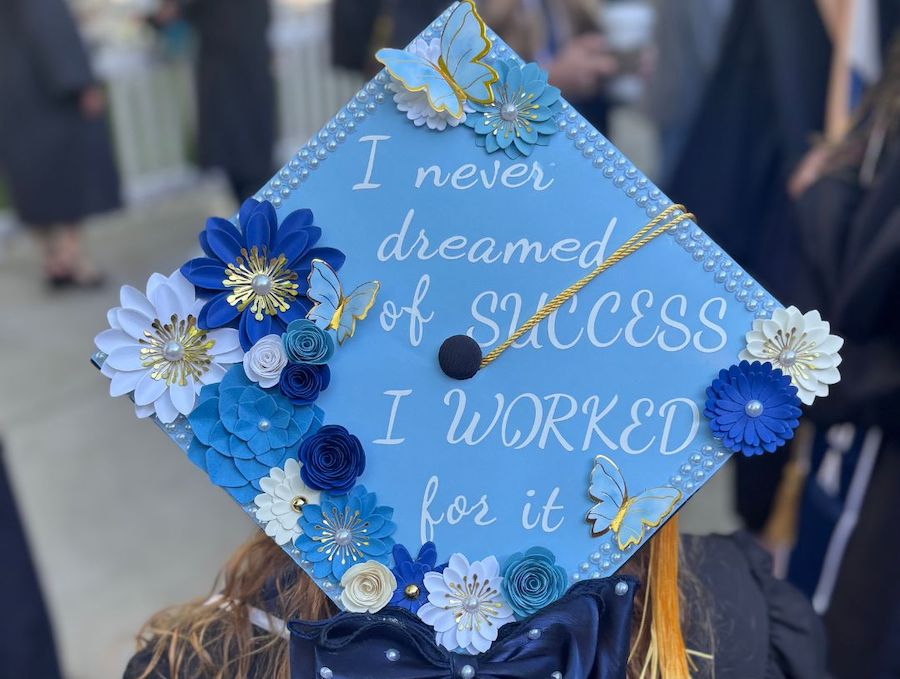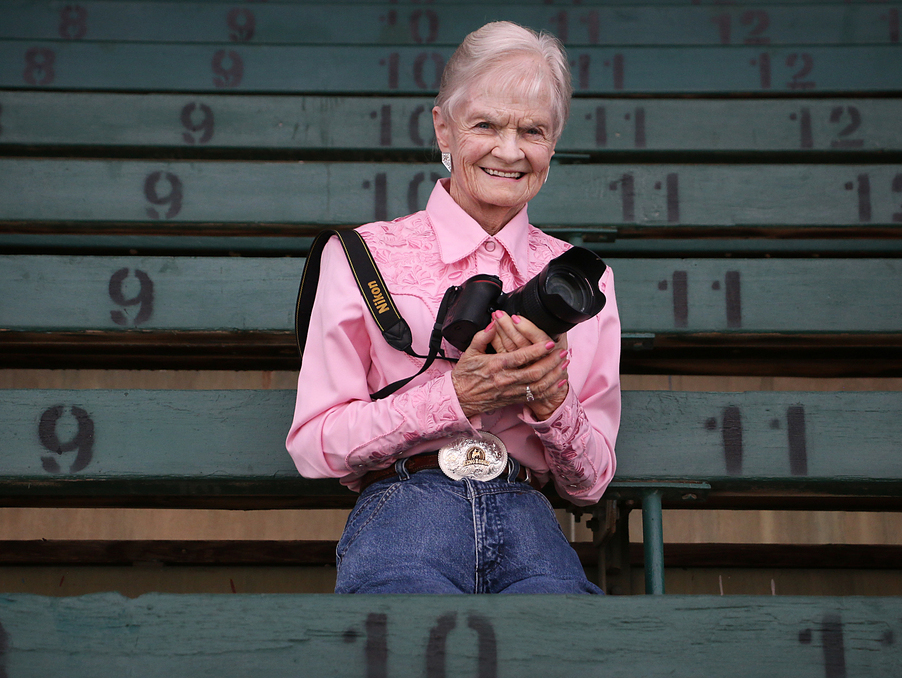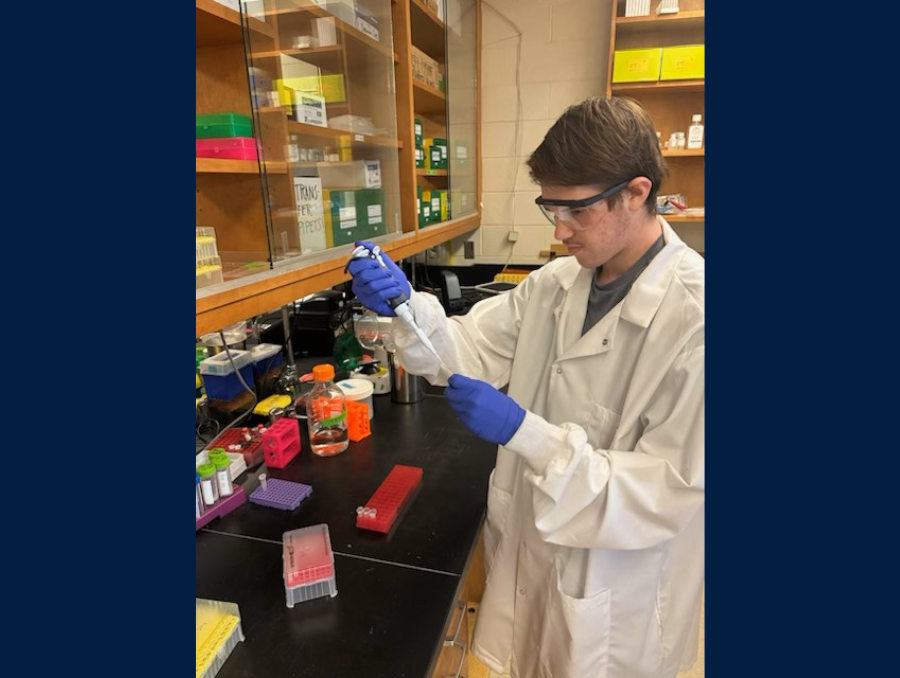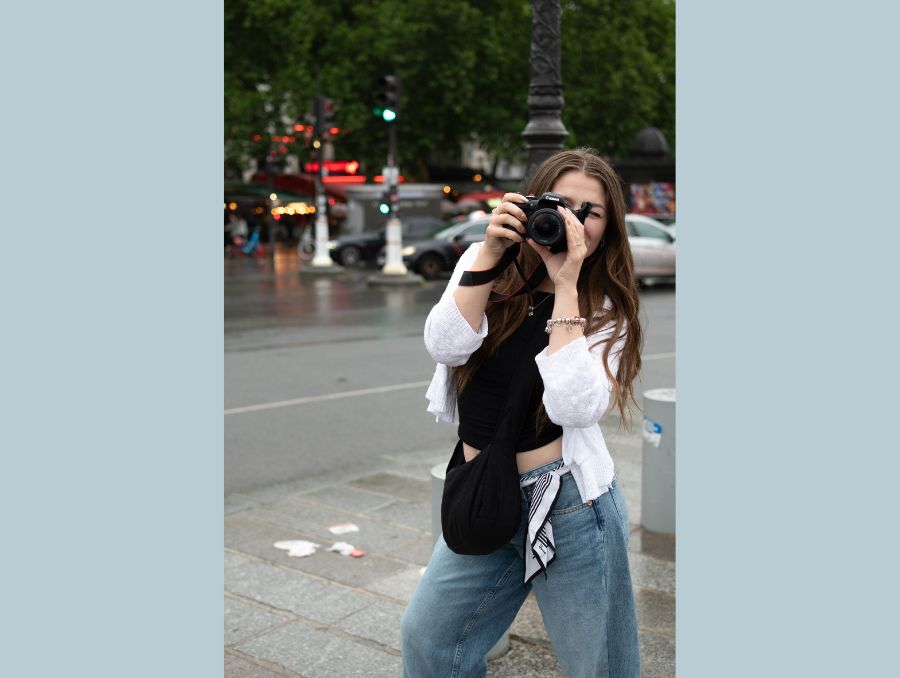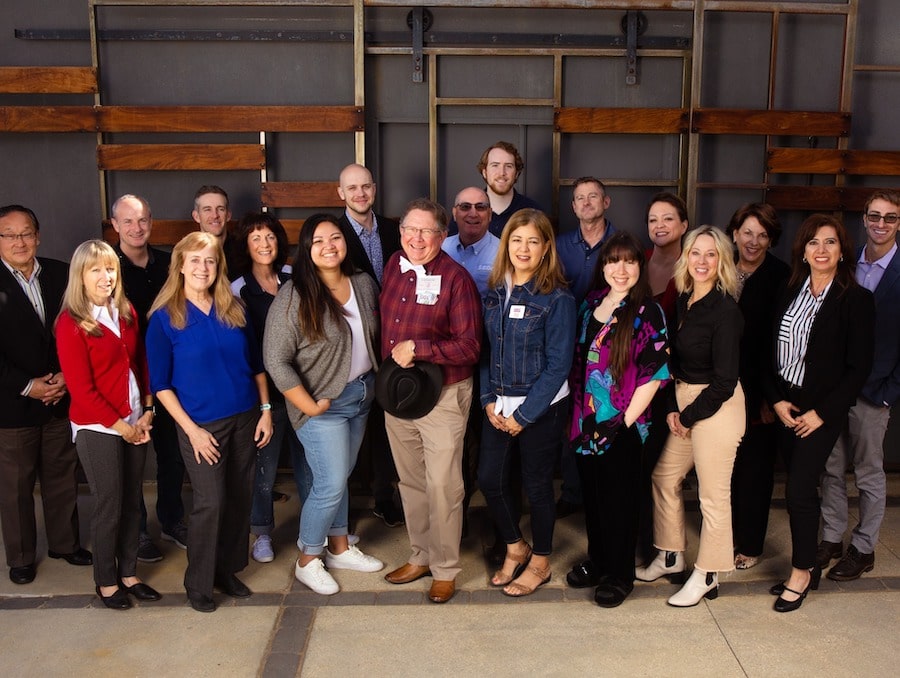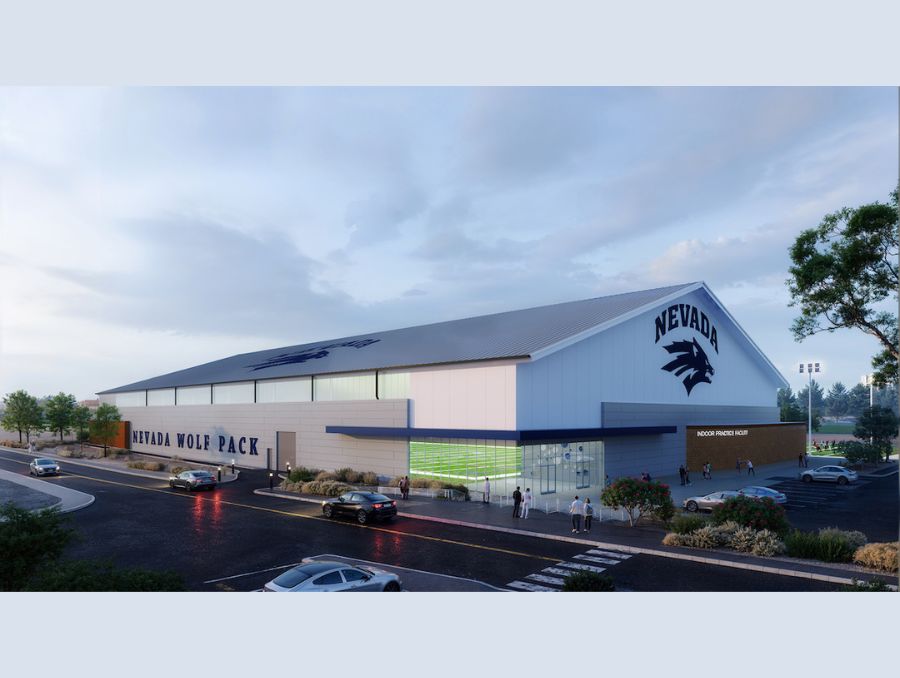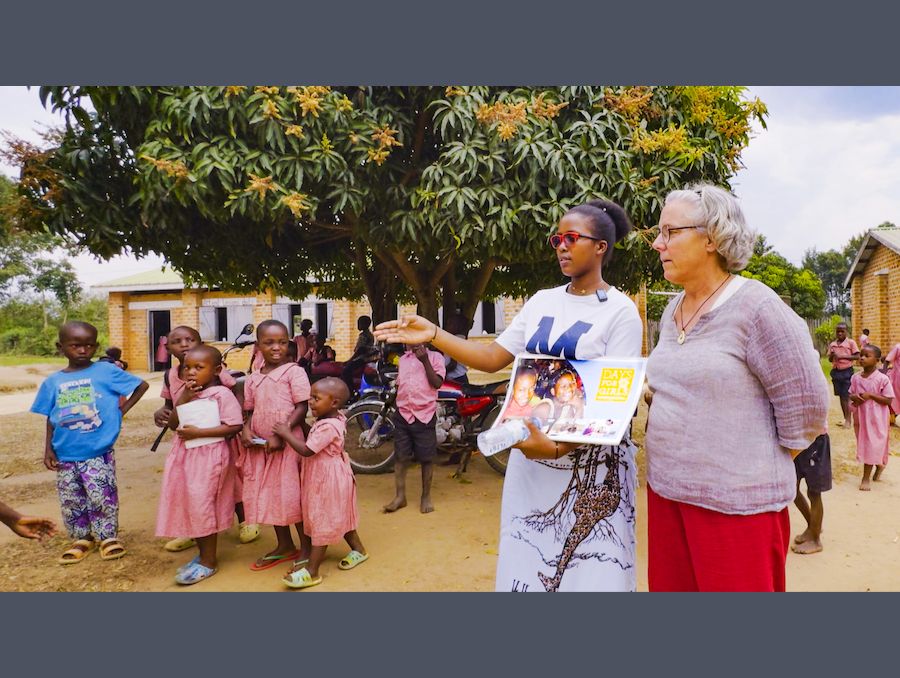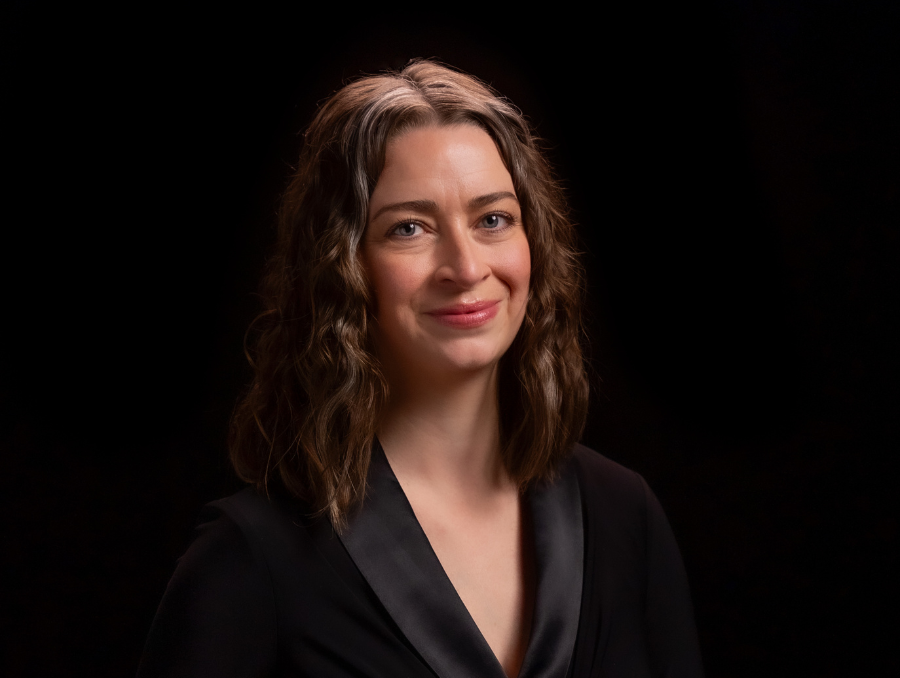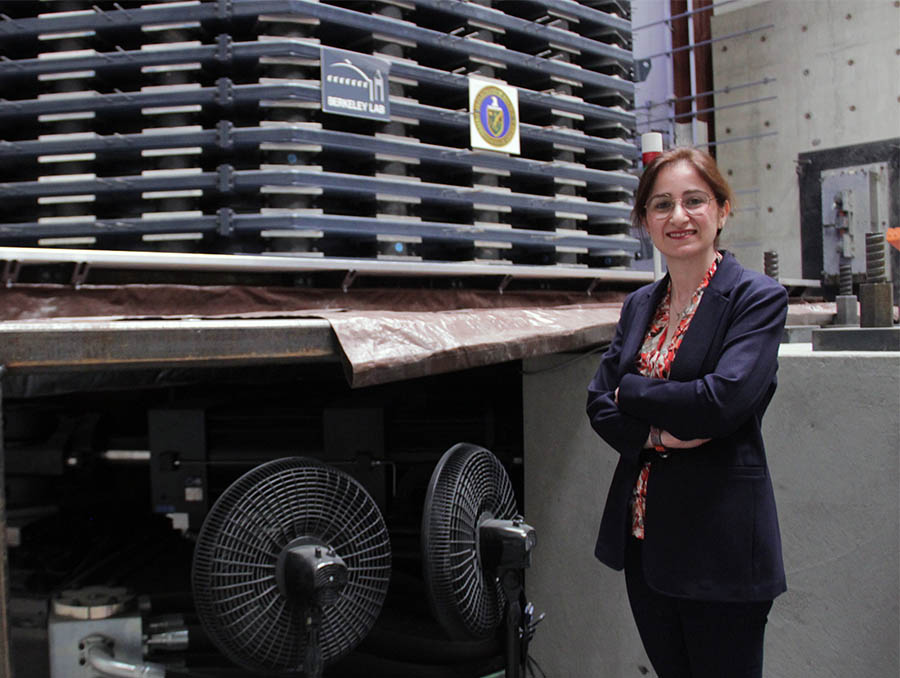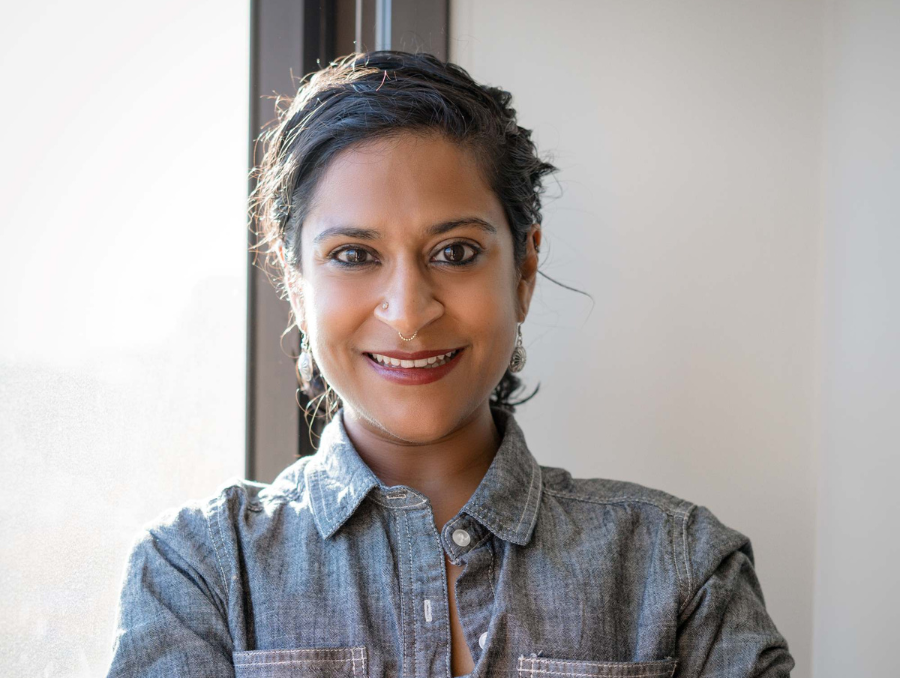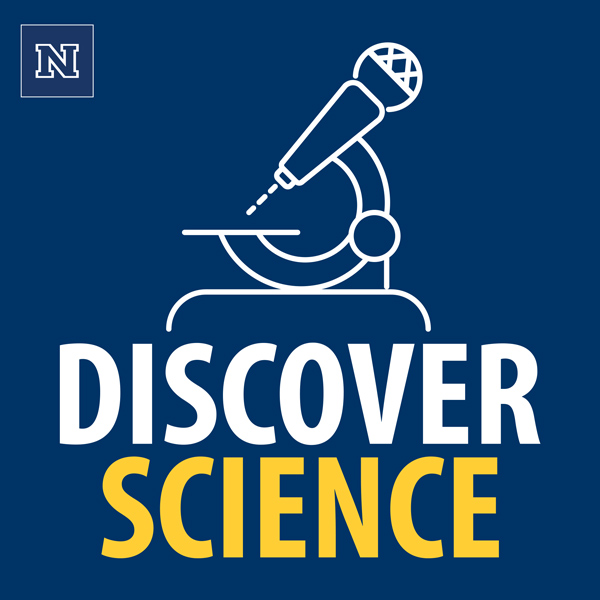
To its disciples, science can seem like an infallible tool to determine fundamental truths about the world that we live in. But the truth is, science can fall victim to misinformation, disinformation and fraud, like many other institutions. Some scientists have turned the proverbial microscope on science itself.
Jevin West is an associate professor in the Information School at the University of Washington, and is the co-founder and inaugural director of the Center for an Informed Public at UW, aimed at resisting strategic misinformation, promoting an informed society and strengthening democratic discourse. West is also the co-founder of the DataLab at UW, a Data Science Fellow at the eScience Institute, and Affiliate Faculty for the Center for Statistics & Social Sciences, and is a visiting professor at the University of California, Berkley.
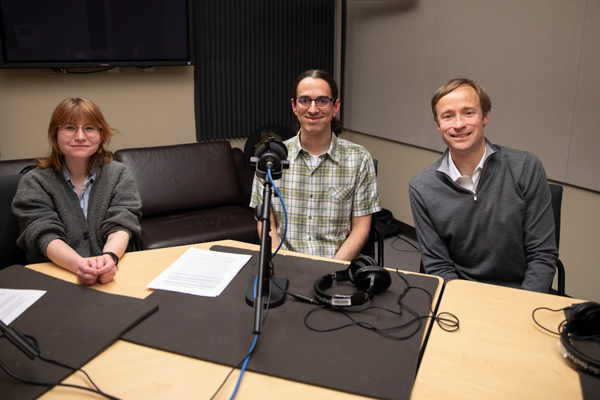
West visited the University of Nevada, Reno for a Discover Science lecture and was hosted on the Discover Science podcast by associate professor of statistics Paul Hurtado, and Maddie Lohman, master's and doctoral student in the Department of Statistics and Data Science and the Ecology, Evolution and Conservation Biology program. The three discuss issues related to trust in science, education about how to identify trustworthy information for people as young as kindergarteners to the elderly and how taking an interdisciplinary approach is critical to making progress in the information sciences.
Discover Science: Jevin West on misinformation in and about science
Discover Science speaker Jevin West is joined by associate professor of statistics Paul Hurtado, and master's and doctoral student in the Department of Statistics and Data Science and the Ecology, Evolution and Conservation Biology program Madddie Lohman.
About the lecture series
The Discover Science Lecture Series was established by now-executive vice president and provost of the University, Jeff Thompson, in the College of Science in 2010. The goal of the series is to bring the country's top scientists to the University campus to share their scientific insights with the community. The Discover Science podcast is an offshoot of the lecture series.
"Science encompasses a wonderfully diverse collection of explorations into the unknown. We invite science lovers and the science-curious to join us and experience the extent of the science universe as the best scientists on the planet visit the University of Nevada, Reno for our Discover Science Lecture Series," Thompson, who served as dean of the College of Science at the time, said.
Maddie Lohman
Hello. I'm Maddie Lohman. I'm a master's student in the Statistics and Data Science program and a Ph.D. student in the Ecology, Evolution and Conservation Program here at the University of Nevada, Reno in the College of Science.
Paul Hurtado
Hi. And I'm Paul Hurtado. I'm an associate professor in the Department of Mathematics and Statistics in the College of Science. I'm also faculty in the Ecology, Evolution and Conservation Biology graduate program here at UNR. And we are your co-hosts for this episode of the Discover Science Podcast.
Maddie Lohman
We are living in uncertain times, having just reached the endemic stage of COVID-19, with wars breaking out, and another tense election year in the United States, there are plenty of opportunities for misinformation or disinformation to arise.
Paul Hurtado
Yes. So today we're going to talk about some of that. And with us is Dr. Jevin West. He's an associate professor at the Information School at the University of Washington. He's also a visiting professor, associate professor at Berkeley, and he's joining us for this episode of the Discover Science Podcast. So, Jevin, thank you for being with us today.
Jevin West
Thanks for taking the time to have me on. This is a topic that I get the opportunity to think a lot about, so we'll have some fun today.
Paul Hurtado
Yeah, cool. So I guess maybe before we start talking about science and misinformation and all those fun things, it'd be good if you could, uh, we could learn more about you. So maybe tell us about your role as the director of the Center for an Informed Public. And how often are you working directly with the public in that role?
Jevin West
Absolutely. So my colleagues and I founded the, we co-founded the center back in 2019. This was minutes before the pandemic, it seemed. It was actually in December, but it seemed like minutes before things really went south when it comes to the, to the pandemic. And it was at that time that we had been, for many years, worrying about this issue of misinformation and its, and how it impacted things like elections and crisis events and impacted even things like science, which I care very deeply about.
And so we got together and we wrote some, we did a lot of work writing proposals and, and things to get it established. And now it's a center at the University of Washington that spans multiple departments. It's housed in my school, which is called the Information School, but is connected to the law school, the computer science department, the engineering school, the College of Arts and Sciences.
And we have Ph.D. students and postdocs from all these different disciplines working on this program. And in the first couple of years, I agreed to do the directorship. But now I've turned that over to my colleague Kate Starbird, who's been doing a great job leading it. I'm as active as I was before, but a little few less meetings here and there dealing with some of the challenges you can imagine when you're studying misinformation. So that's a little bit about the center and maybe we'll get more into it later. Yeah.
Paul Hurtado
So you mentioned that it was right at the beginning of COVID. How did that shift kind of the launch of that?
Jevin West
Right. Boy, did it ever. The plan actually was to study the issue as it related to crisis events and elections and places where there's always a challenge when it comes to, you know, getting to, sort of, reliable information. But like for many researchers, it changed our trajectory pretty dramatically during that time. We'd always been collecting publicly available data on, on these issues like, you know, from Twitter or now it's X.
And when we started, you know, working on COVID, that's if you, if you look at what we were collecting, it was mostly what people were talking about at the time. And actually, if you look at academia, there's been some nice analyses on it. We've done a little bit of this ourselves, but looking at how others in other fields shifted from the work they were doing in statistics and even in, well in biology certainly, and physics and all these different fields that were shifting to trying to pay attention to this problem.
And certainly when it comes to misinformation, we were, we were working on that pretty much 24 hours a day. We had students and faculty working on things like doing really deep qualitative work, trying to understand the online communities around discussions of vaccinations, to doing large quantitative, computational social science-like studies, looking at the ways in which ideas were kind of swarming like a swarming, you know, you know, school of fish or whatever.
In fact, we have a, we hired a postdoc that had expertise and studying schooling behavior in fish and came and used the same kinds of models to study schooling behavior of ideas on Twitter, which was an interesting way to think about the problem. But yeah, so that I mean, I would say that most of our work during, during COVID was on COVID because that was what was in front of us, but also because that was what people were talking about online.
Paul Hurtado
Yeah, cool.
Maddie Lohman
I guess these large events can often mask, kind of, smaller things happening in the background, if that makes sense. Things fly under the radar like other sources of disinformation, maybe not about COVID, but about other topics and politics and health, etc., etc. Did you guys look at any of that? What disinformation outside of COVID was being spread kind of under this radar of all this kind of, you know, very warranted worry and media attention towards the pandemic?
Jevin West
Absolutely. It's a great question. And we did do that. In fact, some of the most effective kinds of disinformation campaigns are ones that do fly under the radar, not just under our radar as researchers, but radars of those on trust and safety teams at, at these different social media companies, and under the radar of rules that, you know, at least the few rules we have on the Internet. And some of the ways in which we looked for those hidden areas of the Internet, were to look at groups like diaspora.
So we have a researcher in our group, Sarah Newman, and, and Rachel Moran, who's been working on looking at the ways in which these issues disproportionately affect those in diaspora groups. So they were looking at a Vietnamese diaspora group in Seattle and how they were being impacted by information very differently than we are in the English-speaking world. We they, the information they were getting, were, they were coming, of course, from the United States, but also from Vietnam and other, and other sources that we don't necessarily track because we're looking at these larger trends that are going on.
It's hard to ignore, you know, some of the hashtags that arise after a major new policy that's passed around masks or around vaccinations or a major new vaccine that was released or a new finding around the pandemic or, you know, around the virus itself. And so the, the, the challenge, of course, is figuring out where you go about looking at that.
And so, you know, a lot of this is driven by the students saying, you know, I found something really interesting over here. We should, we should be taking a look at that sort of thing. And I think where we did the most interesting things were when we crossed the language border or when we crossed topics like another thing during the pandemic, there are lots of things that continue to occur, like, you know, there is there's always been discussions around fluoridation, but that kind of went under the radar, but it was still being talked about in some communities during that time. But it gets overshadowed by some of the larger stories that you're saying. And I'll give you one other example. So the, when you think about, you know, some of the, the big stories that occur that are driven by daily news, sometimes you forget some of the ways in which these things are connected too, so they seem to converge. So a lot of individuals that you might find in one community, let's say a community that is convinced that that 5G is causing health effects or 5G is, you know, essentially activating something in the vaccines or, you know, there's all sorts of, there's infinite stories I can tell you, that you see that these same individuals, sometimes organizations, are a part of many of these different groups that push and proliferate certain kinds of rumors.
And so it's interesting, this idea of looking at some of these less focused areas. When you do that, you end up seeing how they kind of all are connected in some ways, too. I guess it kind of is that way online, but it really comes, it really comes that way in studying rumors online.
Paul Hurtado
So, so it sounds like you work with a pretty diverse group of people. Your background, your graduate training is in biology. What's it like sort of shifting out of that sort of narrow focus in graduate school and then also now working with a pretty like multidisciplinary team of people and like, you know, A, what's that like? What are the benefits of that? But then also B, what, what makes that work? Like, can you just get any old pile of people with different expertise and throw them in a room and great things happen?
Jevin West
Yeah, that's a good question. I think most of the time, yes. And I think the reason to do it, there are kind of two reasons. One, it's fun. It's fun to learn about what my colleagues in psychology are thinking about and how that relates to things I'm concerned about. It's fun to talk to my computer science colleagues to learn about the newest algorithm and the ways in which it's being misused and abused. It's fun to learn from my biology colleagues to figure out what are some of the big challenges, you know, with CRISPR technology or whatever. You know, there'sb it's just fun. But at the same time, I think it's highly effective at addressing big challenges like misinformation or climate change or a pandemic. Like a pandemic, you're not going to address a pandemic just by hiring a bunch of really smart epidemiologists. That would help. They're smart, and they know a lot more about it than I do. But goodness, we need policymakers and legal scholars. We need computer scientists that, that can figure out ways to capture data and better understand what's going on online. We need to hire sociologists that understand some of the social issues around this and political scientists. And it's not, some of the biggest problems we have in society today can't be addressed by single disciplines.
And I might be biased because most of my career has been at, an active training and navigating and, you know, moving around, hopefully not aimlessly, but moving from one discipline to another. A lot of the work I did in biology was interdisciplinary, and then I spent time in a physics lab for a postdoc, and I work a lot with computer scientists and sociologists now and psychologists, and so maybe that's just the world I like to live in, and I think it's effective. So there might be a bias going on here, certainly a selection bias issue. But I do find, I do, I also believe strongly that that's how we're going to solve some of these big problems.
Maddie Lohman
So what you're describing is this incredibly multidisciplinary and integrative group of people working in this, um, sorry, information school. So with that, would you consider that kind of multidisciplinary, integrative approach key to information science as opposed to something more narrow like engineering or statistics or economics or public policy? Is that the difference, or is that just one aspect of that difference, or am I just completely off base?
Jevin West
No, this is a good observation. In fact, I'll give you three different answers, maybe two. We'll start with two and then maybe I'll get to the third one. So one reason we might be so interdisciplinary is we are kind of a hodgepodge group of individuals that didn't see ourselves just in one discipline. I didn't quite fit in biology as an individual.
It had been probably hard to get a faculty position given all the computational work, but I wasn't quite in computer science. I wasn't publishing as much, in ICML that, you know, that my colleagues would have expected me to. But I was publishing a little bit in biology, and also I was publishing a little bit economics, but the information school embraces that.
So I think maybe we gather those kind of individuals. We're kind of a new thing on a lot of campuses, but it's called different things on different campuses. It's basically individuals that are interested in the ways that technology interfaces with society and, and human's everyday lives. And so we study technology. And for me, I study the ways in which it impacts science, both in good ways and bad ways.
But it, but I also think that the problem at hand, which is large, it's this, you know, what's the impact of technology on society. And that's a, that's a big thing. And there's no way you could do that just in stats or you couldn't just do it in a design school or a social science college. So maybe it's, it's the question at hand, but there are skills that need to be picked up. And I am not totally against, you know, some of the disciplines that we have named buildings of on campuses that, like having that there is value in that there's a common language that can tie those disciplines together. I just think, you know, when you see the emergence of centers, for example, on campus, there are typically problems that don't necessarily fit in one school.
And so I think going forward, and universities have recognized this for a long time, that we need we need a mechanism for addressing challenges that would take too long in the old brick build-- it takes a long time to get a brick building in the name of your discipline. So that would take time. So I think an information school is just kind of a way, at least to address the big challenges around technology.
Maddie Lohman
So I guess with that, during your answer, you mentioned this idea of technology's impact on society, right? And I always wish I could remember who said it, but there is that, quote, goes, “Writing. It's going to be, just, devastate the youth's minds because they won't be able to remember anything.”
Jevin West
Yes.
Maddie Lohman
So I guess just with that in mind, what do you see this role of technology and information, this constant stream of data, more than just, you know, writing on a clay tablet? How do you see that impacting society? Is it positive, negative or neutral? And especially with the proliferation of data, what do you think that larger impact is and might be moving forward? Sorry, that's a huge question.
Jevin West
No, it's a huge question. I hope we have 5 hours here tonight because that is, really is, and it's a, it's a, really it's a question that I think a lot about, and clearly you're thinking about too, by, by asking the question. I think it's all of the above. I think it's, it's good in some ways. It gives us access to information to go about answering questions maybe faster than we could have in the past. It doesn't mean we couldn't have asked those questions, but we can do that more quickly. I can, I can access a paper quickly. I can, you know, throw up an analysis quicker. I can do a presentation faster. There's things that we can do faster. But on the negative side is that we're overwhelmed with information. So overwhelmed that it's hard to identify the most reliable information out there.
I only have so many cycles and we all only have so many heartbeats during our lifetime to be able to read all this material. So when people get so excited about, you know, LLMs, ‘Wow, they're going to write our papers for us,’ so that you can write 500 papers a year instead of five? Well, who's going to read those papers? The AI? Maybe. But then, you know, I guess we're just turning AI over to science. I don't see science as something that's just done. It's a social process. We, it's that engagement that's as important as actuall,y the product of science, which could be paper or something, but it's also the ideas and knowledge. So I, I when I, think of technology and its role in society, well, I mean, I spend most of my time on the critical side of it.
I spend time thinking about the ways in which it's slowing the institution of science, the way it's affecting society in negative ways. But I also see its potential, certainly its ability to, you know, find protein structures in ways that we couldn't have and it would have taken too long, its ability to mine genomic databases in ways that, you know, we could have never done, you know, at least in a lifetime.
You know, there's so many things that it can do that that we couldn't do before. But what it also does is it creates yeah, the challenge today is not the information. It's, that's not the limiting resource, of course, and it's not evidence. That's not the limiting resource anymore. The limiting resource is our time to ascertain what's useful and not to read and to try to understand.
And so it's yeah, this, the overwhelmingness stuff, at least as it impacts science, is one of the big challenges going forward and being able to decipher what's, what's useful or not.
Paul Hurtado
Yes. I mean there's, that that sort of segues into some other things that I’d hoped we’d get into, and on one side of that there's, you know, how does that impact science and how we do science? On the flip side, there's this question of how does the sort of general public right sort of digest what science and other sorts of information are throwing at them and make sense of all that?
So I don't know. There's a lot of directions to go there. I don't know which way you want to take it.
Jevin West
Oh, my goodness. Let's let me just start with one, Paul. It's a great, it's a, it's a, it's a these are all great questions and really episode length kinds of answers needed to be, to give them, to give them justice. But let me just start by saying that the public's engagement with science is a very good thing. I want that.
And it's the rise of citizen science, for example, is made, gets me so excited, puts a smile on my face. This is what we want. Science is not something that can only be done by those in the ivory tower. We should all be engaging in science. So when I talk about the ways in which this, the public, for example, engages in ways that are, you know, that there may be misleading information out there or they may not have the same training that we get the opportunity to have working on a campus, working in science every single day, that they might not be able to tell the difference between a predatory journal and a journal that's more reliable, not perfect, but more reliable. They might not be able to tell that just credentials, PhD credentials, don't guarantee that someone is, you know, more reliable than the other person that they heard in the lecture halls at a public, you know, at a public lecture. You know, they might not understand what a random control trial is. They might, the public wants to engage, but they might not understand, you know, the ways in which science tries to formalize uncertainty and that these kinds of things, there's all sorts of things I could go on and on and on. And that's our job in science. That's our job in education to, to provide that information. But without those tools, things can go awry sometimes and people can be misled.
And, and by the way, people might have ideas that are different than even the consensus in science. That's even okay, sometimes. But we need to do a better job talking to the public about not just evidence that they have to support some story or narrative that they have, which is great that they can have that. But to come to the table with a discussion about how they decided what was a reliable source to tell me what your methods are for prioritizing one source over another, essentially having discussions about epistemology, How do they know what they know?
We need to have more discussions about that and then we can have discussions about the evidence that they have at hand. And I think we can have more productive conversations when it deals with science issues. But I just want to really emphasize that I am such an advocate of engaging the public with science. And when I saw that during the pandemic, you know, and having the public see science happen in real time and how messy it can be and how people change their opinions, thank goodness they change their opinions when there's new evidence. It doesn't mean they're, they’re equivocating and that they don't, they're not sure. It's just sometimes new evidence comes and you change your opinion. That's science, wonderfully, but it's also messy. Anyway, just trying to teach the public about the social elements of science, that it is a social process. It's not something that facts just drop down from the sky.
Maddie Lohman
So something I wonder about with that, you talk about epistemology and engaging the public and obviously K-12 education and outreach opportunities are critical, vital, super important. But something I always wonder about is how do we bring this quantitative literacy and this science literacy to adults who have a lot less free time, who are dealing with a million life things, but that is valuable information that, you know, they just might not have been exposed to at that point in their lives? How do we reach out to adults specifically who are trying to engage with data, with information, with science, but might not have the resources to do so, right away at least?
Jevin West
You are talking about a topic that I think is so important and it truly is the long term strategy that we need to improve in this area, in this area, because so much of the world is being quantified and for many reasons, that's a, that's a good thing. It's part of what we do in science, but we don't do a very good job, and I admit that fully, in educating the public, even educating people within the professional world of science, sometimes we need to do a better job of this. It's, it's challenging, though. So I think we need to think about informal settings for teaching this. So one of the things that we're doing in the center is we have a National Science Foundation project that engages rural libraries, that engages community organizations, community colleges, just because of the great access to the population that community colleges have, and then K-12 schools.
We also have been working on partnering with AARP and organizations that reach some of the older adults in our population. I think we have to figure out ways to reward that work, too, because on a campus, you know, we're kind of rewarded, ‘Okay, did you get your, let me see your CV. How many publications do you have?’ Well, it would be great to be, those are good publications. But you know, what kind of public impact do you have? We’re a public university. We’re funded by those taxpayers. And it's our job to give them the toolset so they can make a decision. Because I think most people, I wouldn’t say all people, but I would say most people, by a pretty large margin, genuinely want to get to the right information, that want the tools to be able to make good decisions for themselves, for their families, and for their friends and their neighbors. And there is a lot of information out there. It's even hard for those that are professionally trained in these areas. But because the world is so quantified, we need to figure out ways to teach them better data reasoning, it is something that it's a passion project for me, and I've written about this with my colleague, I have a class on this, but, but there's all sorts of great efforts around the country where this is happening as well. But it's only, you know, it's a drop in the bucket. We have to change the way that we do education at all levels. And I think it's in these informal settings that work.
And I'll give you one example that I absolutely love, at least when it comes to media literacy. Quantitative reasoning is another issue. But we have this program we call, it's called Misinfo Day. The idea is that we bring high schoolers to campus and we spend a whole day thinking about media literacy, which includes data reasoning. But it, you know, it's one day and that might be the only day sometimes the students will get to talk about media literacy in the context of these different subjects. But then what spurred from that event was, and it was started by a high school teacher and a high school librarian where they teach high schoolers that for an entire semester, and then they teach their grandparents, their neighbors and their parents about this.
And I love it because those are people, the kids, that the grandparents are actually going to trust. They're no going to trust me like a professor, or maybe they will. I'd like that. But I, they will listen to their grandkids, and I think that's a chance to do some intergenerational learning. So I think there's opportunities like that. But we need to utilize the infrastructure we have built in our country around this, which are libraries and, and some of these, you know, community centers and other things to, to provide these opportunities because, boy, the information world and the technology world is changing so fast that if we want to prepare our public to be most successful and not fall behind, that we need to figure this out soon. And the quantitative reasoning is a big part of that.
Paul Hurtado
Yes, I mean, I think you hit upon this issue of trust as being an important part of how information gets conveyed. I was wondering if you could sort of maybe define misinformation and disinformation and the differences between those two things. And then like, what is your advice to people on either, you know, on the one side of being a sort of science person, right, developing that trust, when you go out and do sort of public outreach type things, but then also for just being your, you know, general citizen, right, as a consumer of knowledge, how do you learn who to trust and who not to trust?
Jevin West
Yeah, trust is such a big part of this issue, not just for misinformation but for the institution of science. I think the public puts a lot of trust in that institution, and fortunately, it's one of the most trusted institutions. There's been a little bit of drop over the last several years during the pandemic in different parts of the population.
But overall, still, when you compare it to other institutions, it's trusted to a high degree, which is fortunate, but that's not a given. And I think we have to work at that to continue to maintain that trust. But for me, when I talk to the public, just going out in person, I find, is the best way. I think online is probably one of the worst ways to go about doing this.
And that takes time and it doesn't scale well, but it truly is the only way I think, is to talk to people and, and to listen as much as we speak. And I think those are basic tenets that we you know, we've been taught since we were young, but they are really important for this particular issue and gaining that trust.
But it also needs to come within the communities themselves, and I think because people trust those communities. So we have to let that be driven. And so we call this when we do this work, it's co-participation, it's co-design, we call it. We have a project called Co-design and we co-design. This is not something that we come in and sort of land some papers on the desk and say, ‘This is what you need to know.’ No, we're like, we talk to them about what issues they care about most in this space and as they interface with science, there are some issues that some communities care about more whether you're an agricultural company or community, whether you're in a community, you know, in downtown Seattle. I mean, there's, there's going to be different issues at hand. And then that's where we start the conversations.
But I think, you know, these issues of trust too, are, are really, when you talk about all institutions, are a real serious issue right now. In a democracy, we depend on this trust. So when people continue to see, you know, technology get better and better at creating deepfakes and images and videos and audio and text that's not generated by humans, my fear is that makes us even less trustful of the system.
And that's what concerns me most. And so when I, when, when that continues, that is concerning because people retreat into their, their small communities and we depend on people's expertise in different areas. There's just too much to know about the world. And so that's an issue that we, we have to, we have to address and it has to be done I really, I really think offline, like offline, is, even more so than online. And so, yeah, I think this issue of trust is, is such a, is a big one, but it's, but it's a tricky one. And so what are we going to do in the next pandemic or what are we going to do in the next crisis where we need the public to respond as a collective and not in ways that are so distrustful? And so, yeah, we have, we have some serious challenges ahead because trust in these institutions took a big hit.
Maddie Lohman
How do we find that balance then, between this trust and then media literacy, which requires skepticism and critically engaging, questioning. You know, that's a hard balance to strike. So I guess how do we educate the public, you know, whether in-person or online, about how to walk that fine line?
Jevin West
We spend a lot of time talking to the public about being skeptical, but we don't want to push that too far where they then have no trust in anything. If you become so skeptical and like, I don't, I don't trust anything. In fact, I've talked to middle school students about this, and I see this more from the younger folks than any of the other groups that I talk to, that I'll show them something and they'll go, ‘Well, yeah, I mean, I don't trust anything on the Internet.’ And I'm like, ‘Whoa, whoa, whoa, whoa.’ I'm like, ‘So if you go to this Wikipedia page,’ and I'll show them something about some math concept or something, like, ‘Nope, I don't trust it because that's, that's been edited by lots of people.’ But I, ‘But actually, here's some reasons why it might be one of the beacon of light on the internet. Let’s, like, you, it's okay. I mean, that's not perfect and there's problems.’
So I think what we have to do is remind them of that, that there, there are places that are more reliable. They're not perfect, but just little tips like, you know, does the news venue that you go to, hopefully you go to some, do they admit mistakes? Do they do they provide links and references? Do they, do they do some self-reflection when they make a mistake? Do they have retractions? Are there, are they right at least most of the time? You know, you can’t expect perfection. You know, if, if something sounds too good to be true, it probably is. Or if it sounds too good, bad to be true, you can trust your gut sometimes. I mean, not fully trust your gut. But if you do that, you need to pause a little bit and do a little bit of extra checking. I think that's helpful.
And then if you know, if, if you see something that you know is kind of worth sharing, before sharing it, maybe do just a little extra work before, I always sort of say, you know, ‘Think more, share less.’ We should be thinking a little bit more than we do and sharing a little bit less and feeding these algorithms for, you know, sharing to the next person and amplifying sometimes things that aren't worth amplifying. So, yeah, like walking this really thin line of trying to figure out how to help people become skeptical but not too skeptical, I think really comes from case studies and examples and practice.
We have to practice it all the time. I have to practice it all the time andb I teach it. So I think it's it comes from practice. I mean, that might be one way of at least addressing it and then reminding yourself not to be too skeptical.
Paul Hurtado
So I'm a bit of a crazy bird watcher when I have the time. And one of theb one of the things that was sort of a big, sort of, I don't know if you'd call it like a scandal, right. But there was this big to do about a few years ago, someone reported they had observed an ivory billed woodpecker, which of course, is extinct.
And there was a actually quite a bit of conservation money thrown at trying to protect the habitat and go in and see if they could actually get some more concrete evidence that at least one or more birds existed there. And the result of that was no concrete evidence. And so it generated a lot of questions about, you know, should all those resources have been spent that way or not.
And, and it got me thinking about, well, you know, there's, there's sort of varying levels of, I guess, sort of misunderstanding, misinformation that that float around sometimes. And some of these are more consequential than others, right? So a very inconsequential example of, I guess a bird-related thing, would be sometimes people think they find this new way of looking at some field mark on a bird that, you know, there's two species of birds that are really similar. And when you have them in your hands, you can measure things and tell them apart pretty easily. But when they're, you know, 50 yards away and you're looking at them through binoculars, they're really difficult to tell apart. So somebody will think, ‘Oh, I found this new, you know, ratio of these two spots on these feathers that now I can tell them apart.’ And it turns out that that you know, if you, you know, do the statistics, it's not a great way of distinguishing the two species, but it'll catch on.
And there's sure some minor consequences of that negatively impacting citizen science projects and things like that. But so, so have you given much thought to the sort of consequences of different kinds of misinformation and how that feeds into doing outreach to, to teach people ways of identifying misinformation? Because it seems like people can get very dug into a certain idea.
And when you approach them about, ‘Hey, I think that you might be listening to the wrong source of information on this,’ they're really defensive about it, and that puts up a lot of obstacles to trying to have a meeting of minds, right? So, so have you looked at the sort of ways in which you can approach these topics with the public and how the nature of this specific topic factors into the success of that outreach?
Jevin West
Absolutely. And I love that example. And I feel, I found, I feel and found that practicing on the inconsequential, at least less consequential prepares us for the consequential. And that's why I love that particular example. In fact, you may know about iNaturalist if you're a bird watcher and someone who appreciates being a naturalist, you know, every day.
Paul Hurtado
That's where all my non bird observations go.
Jevin West
Yeah, your non-bird, exactly.
Paul Hurtado
The bird ones go to eBird.
Jevin West
Exactly. Well what's interesting is so I'm doing this visiting professorship at, at Berkeley right now at the information school where iNaturalist started and I've got a chance, actually I knew, I’m playing around with it myself because I'm also a fan of these things. And I loved the way that discussions were happening around these issues. They were sort of, I call them sort of nano-discussions or nano-arguments.
And so you would, you know, you would adhere to the evidence and people from all across the political spectrum could come to this site on this issue and practice what we, we try to practice in science, and it doesn't work perfectly every time, but it works pretty darn well. In fact, I was so excited about it at one point, I started talking about it and I ended up talking to a New York Times author about this, and she ended up writing this beautiful story about iNaturalist and how it could potentially be a model for some of our other social media endeavors, because it, what it did, is it provided that substrate to practice the kind of norms and behaviors around disagreement, which is okay. Again, disagreement is not a bad thing. That's a good, we want to have healthy environments where disagreement occurs, but we need a process by which we, we adjudicate those kinds of things.
And so, so yeah, I love the iNaturalist, I love this example. And the thing that got me thinking, and that’s your question, that I've been thinking is maybe we should be doing more practice in these inconsequential, less consequential, I shouldn’t say inconsequential. They’re consequential too, to some degree, especially for all the naturalists out there. But we need to do this in ways that are, we need to do it in these environments so that we can be more prepared in the ones that are more consequential. And of course, there's other elements when it comes to more politically charged issues. But I think it's good practice, and it might be a model because there's, there's, there's a system that's been set up at iNaturalist in other places, and you know this better than I do, that have, that are quite effective. And I just think that we have a lot to learn by looking at those systems.
And I just love the ability to take sort of these again, like these very, very discretized pieces of evidence. ‘Here's my image. Do you see this? Do I see this? Not sure if I-’ you know, and we can do that, actually on social media. And we do see it to some degree, you know, with groups that, for example, are, you know, monitoring satellite imagery. And they'll have discussions about this. And, and those have sometimes very consequential issues if it deals with conflict or it certainly dealt with the pandemic and things. And so, so I do kind of see it playing out in other environments.
But I just yeah, I just, I love, I love iNaturalist and you’ll have to take me birding some time.
Paul Hurtado
Yes, yes. Can do. One thing that I have noticed is that sometimes people are really good at communicating scientists, uh, communicating science to scientists, right? And they're not so good at communicating that science to the public. And then also vice versa. There are some people that are just wonderful at engaging with the public about these things. Do you think people should be great at both or do you think it's fine if people are good at just one or the other?
Jevin West
Well, I think the most important thing is that we're encouraged to engage, if we're willing to. Not everyone is willing to or wants to or is good at it. But I think at least trying, because that human aspect is an important part of science and it’s an important part of communication and it’s an important part of trust. And we need all of those things to continue this great thing that we get to do in society.
I mean, I see science as one of the greatest human inventions that's helped us solve some of the biggest problems. And also, by the way, it's super fun and there's so much to be gained from the activity. And the more that we can engage the public and not isolate the public, that's why in a further question, we were talking about, you know, some of the issues that can occur if someone doesn't have quite the training and, and they can be misled. And that does happen. But, but goodness, let's, let's engage in all forms that we can.
And if you're good at one thing, and if you're a good communicator, we need that. In fact, we have such a small number of science journalists in the United States that are, that are full time scientists. In fact, there's been some studies on this that, you know, we depend on people's goodwill and their free time and their willingness to sort of, you know, do the sort of Uber, you know, selling of their time as a journalist.
So, you know, moving from one journalist's venue to another just to make ends meet. So, we depend on that sort of effort. And by scientists taking their free time that they're not getting most of the time rewarded on campus for doing. And so I just think that we, we really do need to engage and provide the mechanisms for doing that.
And then we do need to reward it at some degree for faculty that are really doing that sort of thing because it takes time away from some of the other traditional things that we need to be doing. But maybe there's a balance because we need it more. I think we need it more than ever.
Paul Hurtado
Yeah, definitely.
Maddie Lohman
So something I think a lot about is K-12 education, especially as someone who really struggled with quantitative literacy growing up and wasn't, I didn't have a class in media literacy, like that is a lot to teach a kid. So something I wonder about is how would you start to introduce to our youth these concepts of media literacy, quantitative literacy, these kind of social dynamics governing how we receive information and knowing whether to trust it or being more skeptical? When, I guess in a child's education, would you think is a good time to introduce that? How do you think we should go about introducing that in the most effective way possible to create adults that have this ability to critically engage with information, and walk that line of trust versus skepticism?
Jevin West
It's a great question and I think we should start K1, and I think we can do that partly because I've seen it happen in other countries. So I've been spending time with colleagues in Finland and Finland always is high on the education markers. They're embarrassed of their position. They're very humble people and they're like, ‘Well, those things are not so…’ They're critical of their own ranking, being at number one, but they integrate media literacy and I would say quantitative reasoning to a pretty large degree across all disciplines. Everything they do, especially media literacy from K-1 through, you know, let's say in K-99 really, because they have great informal programs for their adults as well. And so I think it can happen.
We're starting to see some movement within states. So the state of California and other states and our state and I'm sure Nevada will be up there as well, are considering new curriculum standards around media literacy, because at this point, a lot of teachers just have to find ways to insert it in their already busy schedules. And there are, our teachers are already spread so thin that asking them to create new curriculum to, to integrate it into things, into a curriculum that's already packed is a very challenging thing, so I think it kind of has to come a little bit from the top at least.
I mean, it certainly can happen bottom up and top down. Bottom up, meaning the teachers can figure out, are very creative individuals and will figure out ways to do this. They understand the need. It's not like they're, you know, naive to this. They understand how important this is. But it will help to have some of this legislation passed in different states to require it. And actually, we're seeing it across the political spectrum, like states like Texas have passed some and states like state of California. So it is happening. We're, we're tracking that sort of thing. And we're part of a lot of program development.
And all the stuff that we create is freely available. So any teacher out there that's listening or, or librarian or anyone who wants to use it, everything we create is free, and we've been creating it for years. And that's created based on topics that are of that time. I think we need to at some point figure out how to create some national standards because it's so important to everything everyone in the US does every day, you know, that we engage with these information environments. And so it needs to engage not as a 30-minute class that you take once in high school. It has to be integrated across all things and certainly that should also include quantitative reasoning. And that's partly because that's in everything we do as well. And so we're just catching up with things. And so education moves slowly and that's can be a good thing, you know, to some degree.
But for this because it's, you know, it's just so integral to everything we do, we should probably be looking to models that are more similar to like Finland.
Paul Hurtado
Very cool. So you mentioned that all this is freely available. Is this on the Center for Information?
Jevin West
Yeah.
Paul Hurtado
For an informed public website?
Jevin West
Yes, so the, the URL is cip.uw.edu. We have resources. Those are freely available. We also point to other people's resources and we're continually updating things. You can also just email me or the center. The center's better because we have a great person that's managing a lot of those emails. If you have questions, we can send you information and like if you wanted to run like a Misinfo Day, for example, either in high school or university, we have some grant funding to help you do that, so, it won't last forever. So if you're interested, we really want to help. And, but this is just kind of like a Band-Aid right now. I think ultimately it has to be integrated across our education system. This is the long play. Now there are things that we can do policy-wise when it comes to reducing the spread of misinformation. But policy, it's super slow. We could think of you know, we could look to our technology leaders and say, ‘Help us,’ but oh, they've made a lot of mistakes, too. And I don't have a lot of faith in that as the perfect solution. But the thing I have more faith in and more optimism is just using old fashioned education to better arm the information, all of us as information consumers. I would love to hear your thoughts as educators and students in the quantitative world what we need to do.
Paul Hurtado
Oh yeah, I mean, I would agree that there is no being too young to learn, sort of, critical thinking skills. I think there's just age-appropriate ways of doing that for all grade levels. I think one of the big things I see from the mathematics and statistics perspective is that we sort of tend to isolate that separate everything else, and I think there's a lot of room to integrate quantitative skills, mathematics, statistics, you know, programing and working with computers can also sort of fall into that category, across basically every topic. You know, I mean, if you're, if you're a journalist, you need to know some stats and how to make graphs and how to communicate that stuff, right? And so, I think there's just a lot of room to integrate things more than we do.
Jevin West
Absolutely. And then I look to you, Maddie, who is integrating sort of another discipline like ecology and evolution and biology more general with some of your quantitative training. How do you see, you know, this, you know, how could we use your experience to build a better sort of way about, way of addressing this for the public?
Maddie Lohman
Yeah, absolutely. I think about that a lot, actually. I got into statistics because I liked wildlife biology first, and I was introduced to statistics in this more abstract way, not this concrete, ‘Can you figure out the algebra in calculus’ kind of way, but more, ‘Let's think about how these systems work. How can we understand them and translate them into these statistical models? How does math work to understand our natural world?’ And for me, I think that's a huge thing, is some people are awesome at arithmetic and algebra and calculus, which is sick. Not everyone has that natural talent, including myself. And for me, when I think about how can we, I guess, expand education to just have this stronger kind of quantitative literacy element for everybody is, like Paul said, incorporating these other disciplines and looking at mathematics and statistics in this more abstract way than just numbers and decimals, I guess, and making it very clear, the very direct application of all of it.
Jevin West
What I loved most about, there was so much you said that was great, and what you said to Paul was just fantastic, but it was that you don't have to be the most talented to be able to still work with these tools, these quantitative tools, and can help you then get to what you're really interested, whether it's in biology or chemistry or business.
And I think that that's something that we should encourage people. And one of the things that I wanted to do, at least with some of my class that my colleague and I, Carl Bergstrom, talk a lot about is empowering people with these skills. That data reasoning shouldn't be something that intimidates you but can empower you. And one of the things that I remember talking to you, Paul, before we even started this podcast is, the different ways to go about teaching statistics and sort of swinging back and forth based on the topic. I think that's, that, I don't even know if, I don't know if you have time to even, you mentioned, I just thought it was such a clear way of thinking about, you know, how we go about educating the public about this.
Paul Hurtado
Yeah, yeah. I mean, I think just to summarize that conversation really briefly, a lot of mathematics is taught, sort of, from first principles, and then you logically derive everything. But another way about doing it is to sort of start with the big concepts and maybe it's okay if they're sort of defined in a weird, amorphous, not quite clear way, but you sort of then build down into the details and refine those formalisms.
And I think, you know, just being an educator who works with students in mathematics as well as students in the sciences, that maybe they're coming from a place that they don't just have a really strong math background. I see both of those folks kind of meet in the middle just the same. I see the, the math students really struggle to wrap their head around the science and they figure it out.
And I see the science students that forgot every math class they ever took. You know, they've got a lot of intuition and conceptual understanding, that once you sort of connect up what this equation means in terms of that context, it clicks for them and then they're up and running and they're, they're in good shape. So yeah, so lots, lots of ways of, sort of, lots of ways to skin a cat.
Jevin West
I just love that. And that's and I'm so glad that hopefully we can include some of that because I just, hearing from your students and faculty about how they think about this, these issues around quantitative reasoning and how do we integrate that to make us better consumers of information online because that is, you know, one of our big challenges in society. And I think a big part of that is the reasoning part.
Maddie Lohman
Well, thank you, Dr. West, for joining us today, on the Discover Science podcast.
Jevin West
And thank you so much for having me. This was so much fun. And I could have talked we could have talked to another 3 hours. But I think our listeners may have run out of gas in their car if they're listening to us or something.
Paul Hurtado
Yes, and I'm sure they can, they can, they can read more, you've shared some great resources with us. So yeah, thank you. And it was a pleasure talking with you and learning more about your work, so.
Jevin West
Thank you. And it's been a pleasure thinking and learning from you as well.
